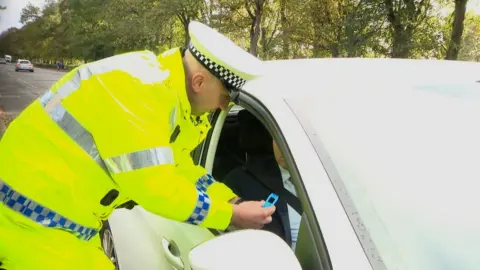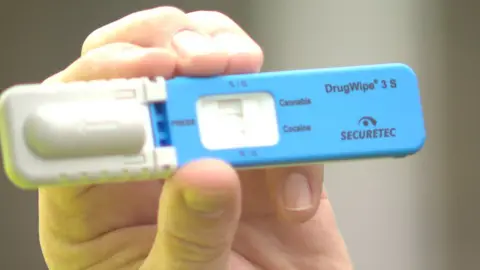Nearly 400 drug driving cases abandoned due to lab delays
 BBC
BBCNearly 400 drug driving cases have been abandoned because of delays in processing forensic tests.
Since 2019 police have been able to conduct roadside mouth swabs and request blood samples from drivers suspected of being impaired by drugs.
The authorities planned to process 1,000 blood tests a year, but demand has been double that figure.
The Scottish Police Authority (SPA) said 386 cases could not proceed as labs struggled to cope.
Roadside drug detection kits issued to officers involve DrugWipes - dubbed drugalysers - to check for cannabis or cocaine.
Suspected drug drivers can also be taken to a police station where, if a doctor considers driving ability to be impaired, they can be asked for a blood sample and tested for 17 substances including ecstasy, LSD, ketamine and heroin.
Director of forensic services Fiona Douglas told the authority: "Demand for drug-driving toxicology analysis has far outstripped what was estimated when the new offence was introduced in Scotland in 2019.
"To date, more than 5,600 cases have been processed for testing and analysis. We have been working hard to manage a continued demand supported by additional investment from the Scottish government to help increase laboratory capacity and outsource a number of cases."
The 386 cases that could not be pursued by prosecutors had reached the current statutory 12-month time limit.
They were primarily low risk cases with no fatality. Three of them involved an injury.

The Scottish government has already invested about £1m to increase capacity by allowing testing to be outsourced to commercial forensic analysis providers. Work has also been done to increase in-house capacity.
Scottish Police Authority chairman Martyn Evans said the pressures meant about 7% of cases were not being prosecuted and it was clear that demand for the service had been underestimated.
"We are deeply concerned that 386 drug driving cases cannot be progressed to prosecution due to testing and analysis not being processed within an adequate timeframe. It is a serious failure," he said.
Police Scotland and the authority's forensic service have been working together since May to find solutions.
Assistant Chief Constable Mark Williams said: "We are committed to detecting and taking action against those who take drugs and drive.
"Being able to use roadside drug wipes has significantly enhanced our ability to detect those responsible and keep the public safe."
"Despite the current challenges around testing capacity, Police Scotland's commitment remains unchanged."
The SPA is due to discuss how to address the challenges at a meeting on Thursday.
